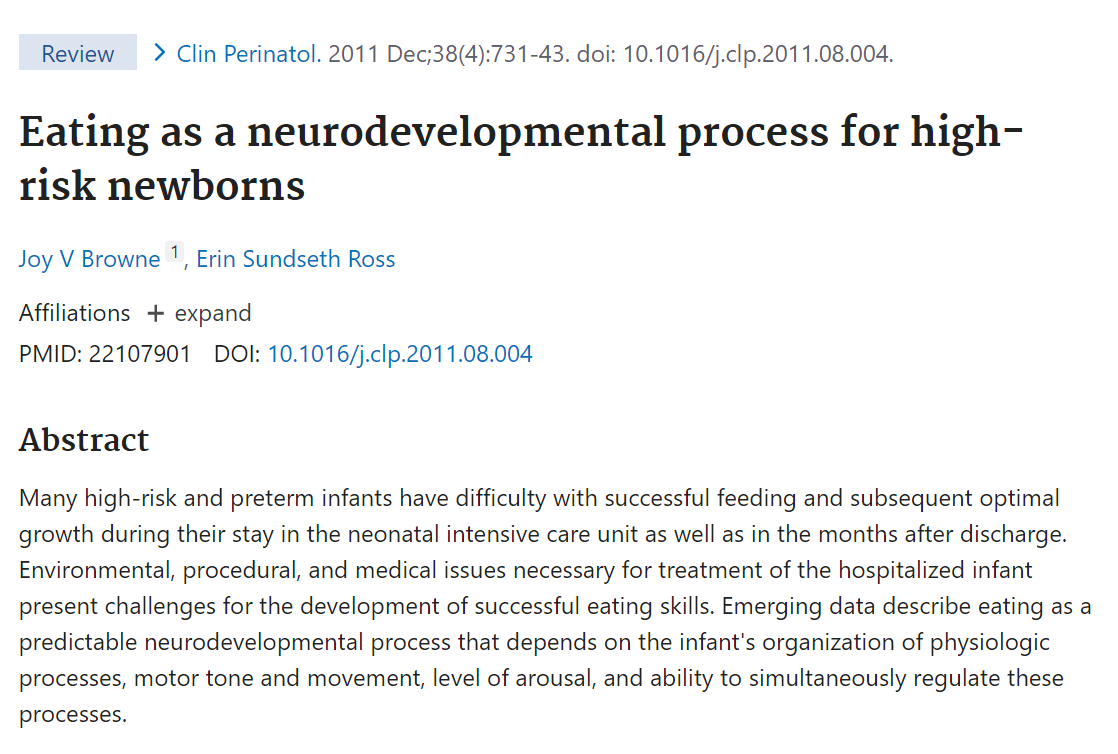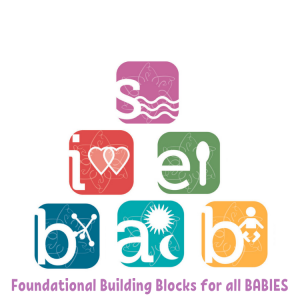Publications and Research Articles


Welcome!
Please check back often for updated research papers and articles
Developmental Care for High-Risk Newborns: Emerging Science, Clinical Application, and Continuity from Newborn Intensive Care Unit to Community by Joy V. Browne (2011)
Neonatology has optimized medical outcomes for high-risk newborns yet neurodevelopmental outcomes continue to be a concern. Basic science, clinical research, and environmental design perspectives have shown the impact of the caregiving environment on the developing brain and the role of professional caregivers in providing supportive intervention to both infants and their families. This recognition has prompted a focus on early developmentally supportive care (DSC) for high-risk newborns both in the hospital and in community follow up. DSC has emerged as a recognized standard of care in most neonatal intensive care units. Still, many questions remain and much integrative research is needed.
Eating as a Neurodevelopmental Process for High-Risk Newborns by Joy V. Browne and Erin Sundseth Ross (2011)
Many high-risk and preterm infants have difficulty with successful feeding and subsequent optimal growth during their stay in the neonatal intensive care unit as well as in the months after discharge. Environmental, procedural, and medical issues necessary for treatment of the hospitalized infant present challenges for the development of successful eating skills. Emerging data describe eating as a predictable neurodevelopmental process that depends on the infant’s organization of physiologic processes, motor tone and movement, level of arousal, and ability to simultaneously regulate these processes.
Developmental Supports for Newborns and Young Infants with Special Health and Developmental Needs and Their Families: The BABIES Model by Joy V. Browne and Ayelet Talmi (2012)
Fragile newborns and young infants who are born with a likelihood of lingering developmental concerns require specialized assessment and intervention based on their unique developmental needs. [ … ] The current study describes the development and components of the BABIES approach to supporting early intervention professionals and nurses to best integrate relationship based developmental supports for fragile newborns and young infants.
Maternal Resolution of Grief After Preterm Birth by PE Shah, M Clements, and J Poehlmann (2011)
Giving birth early is traumatic for families. Many moms grieve after the birth of a premature baby, but working through the grief helps a mom to be a better parent. Moms who feel like their grief is resolved are 3 times more likely to interact positively with their babies and to develop strong attachments to them.
Early Experiences Can Alter Gene Expression and Affect Long-Term Development by Harvard University’s Center on the Developing Child (2010)
This new working paper offers a summary of recent scientific evidence and confirms the importance of early experiences in shaping developing brain architecture. It also illustrates the gap between growing scientific research and policy decisions with four examples given. It suggests the need for public policies to be informed by science in order to adequately address the needs of young children and generate long-term benefits to society.
Findings from the ABCD Screening Academy: Measurement to Support Effective Identification of Children at Risk for Developmental Delay by N Kaye, J May and CP Reuland (2009)
This State Health Policy Briefing examines the efforts of many states to use measurement to support policy and practice changes that improve pediatric primary care providers’ identification of children with or at risk for developmental delay.
Prevalence of Developmental and Behavioral Disorders in a Pediatric Hospital by MC Petersen, DA Kube, TM Whitaker, JC Graff and FB Palmer (2009)
This study looks at the higher prevalence of developmental and behavioral disorders in hospitalized children and emphasizes the need to screen for developmental disabilities. The study was published in Pediatrics.
Supporting Development of Newborns and Infants by JV Browne, A Talmi, and A Immele (2009)
This guidebook made available through Early Intervention Colorado was created to help you understand how babies grow and how important you are in helping your baby’s development. The information in this guidebook can be used for all babies, including those who are in a neonatal intensive care unit (NICU).
Providing Perinatal Mental Health Services in Pediatric Primary Care by A Talmi, B Stafford, and M Buchholz (2009)
This article describes an integrated mental health program located within a busy pediatric primary care training clinic, and how it incorporates infant mental health principles into direct services and educational offerings.
Infants and Toddlers with Special Health Care Needs in Colorado: Identification, Description, Needs, and Recommendations White Paper by JV Browne and B Deloian (2007)
This paper describes and estimates the number of infants and toddlers with special health care needs in Colorado, including evidence supporting their needs, and recommendations.
Chemosensory Development in the Fetus and Newborn by JV Browne (2008)
Expanding knowledge in the development of smell and taste in fetuses and infants provides a foundation for understanding physiologic and behavioral responses in term and preterm infants, emphasizing the importance of continuity from fetal to newborn life and implications for practice in the NICU.
Auditory Development in the Fetus and Infant by SN Graven and JV Browne (2008)
This article explores the development of the fetus and infant auditory system and structure, and the effects of the physical environment, specifically that of the NICU, have on auditory development.
Sensory Development in the Fetus, Neonate, and Infant: Introduction and Overview by SN Graven and JV Browne (2008)
The preterm infant’s neurosensory development is discussed, as well as the role of the NICU environment on these processes, and implications for a developmentally supportive environment and developmentally appropriate care practices.
Sleep and Brain Development: The Critical Role of Sleep in Fetal and Early Neonatal Brain Development by SN Graven and JV Browne (2008)
REM sleep is critical for the creation of memory and the balance of brain plasticity over the course of a lifetime. The NICU environment and parents both play important roles in shaping this area of early development.
Visual Development in the Human Fetus, Infant, and Young Child by SN Graven and JV Browne (2008)
The development of the visual system is discussed, as well as its relation to sleep cycles and effects that disruption of sleep can have on the development of the eye and this system.
Posttraumatic stress disorder in mothers of children who have undergone surgery for congenital disease at a pediatric surgery department by S Nagata, S Funakosi, S Amae, S Yoshida, H Ambo, A Kudo, A Yokota, T Ueno, H Matsuoka, Y Hayashi (2008)
This research study looks at PTSD in mothers of children who have had surgical procedures. The study was published in Journal of Pediatric Surgery.
Prevalence of Developmental Delays and Participation in Early Intervention Services for Young Children by SA Rosenberg, D Zhang, CC Robinson (2008)
Results of a new University of Colorado Denver School of Medicine study are raising concerns regarding the nation’s children suffering from developmental delays. An early intervention program run by all 50 states is available for children under age three but it is not being utilized, especially for African-American children. The study was published in Pediatrics.
System of Risk Triage: A Conceptual Framework to Guide Referral and Developmental Intervention Decisions in the NICU by VL Laadt, BJ Woodward, L Papile (2007)
This article describes a process that helps determine the types and intensity of services that would be needed for babies coming from the neonatal intensive care unit. The article was published in Infants & Young Children.
BEGINNINGS: An Interim Individualized Family Service Plan for Use in the Intensive Care Nursery
by Joy V. Browne, Aimee Langlois, Erin Ross, and Suzanne Smith-Sharp (2001)
This article describes BEGINNINGS, an interim IFSP for use in the NICU. It discusses the rationale that supports the process, a description of the format, and recommendations for its implementation.

- wonderbabies@yahoo.com
- Worldwide Availability
